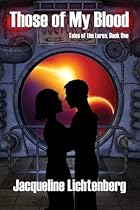 Those of My Blood, by Jacqueline Lichtenberg (Saint Martin's, 1988):
Those of My Blood, by Jacqueline Lichtenberg (Saint Martin's, 1988):
Alien vampires that originate on another planet rather than on Earth as a human mutation. A group of the luren, stranded on our world for generations, have developed into two factions, the Residents, who believe in responsible coexistence with humanity, and the Tourists, who exploit human beings as prey and devote their energies to the goal of returning to their home world.
Residents live on cloned blood and eschew the temptation of feeding directly on human beings; they do, however, crave “Ectoplasm,” human life-force. A luren ship enters the solar system and is being studied at a lunar base, where scientists are preparing to send a message to the luren home world. Titus, a Resident and vampire-human hybrid, is sent to the moon to prevent the message from being transmitted, on the grounds that the luren would prove hostile to humanity.
Abbot, Titus' vampiric “father,” a Tourist, is on the scene to thwart Titus' mission. Years previously, Titus “died,” and Abbot's blood brought him to life, transmuted into the vampire mode of existence — hence their “father-son” bond. On the captured luren, ship a single crewman sleeps in suspended animation.
When he awakens, Titus must “father” him, leading to further complications, as Titus attempts to block Abbot while maintaining secrecy about the vampire species. Lichtenberg assigns her vampires the power of irresistible psychic compulsion, called Influence; luren Influence can even cause human observers to believe they have seen events and objects that bear no relation to what really happened.
A side effect of these vampires' psychic power is that, like Yarbro's supernatural vampires, they possess consummate erotic skills. Lichtenberg also offers ingenious scientific rationalizations for the “native earth” superstition and the belief that vampires cannot cross a threshold uninvited. Though this story superficially fits the “good vampire / bad vampire” model, we gradually discover that Abbot is not “evil,” only an antagonist pursuing goals that seem worthwhile to him by means that conform to his own code of ethics. In a companion novel, Dreamspy (Saint Martin's, 1989), set outside our solar system, we meet the luren on their own terms as respected members of the interstellar community.
